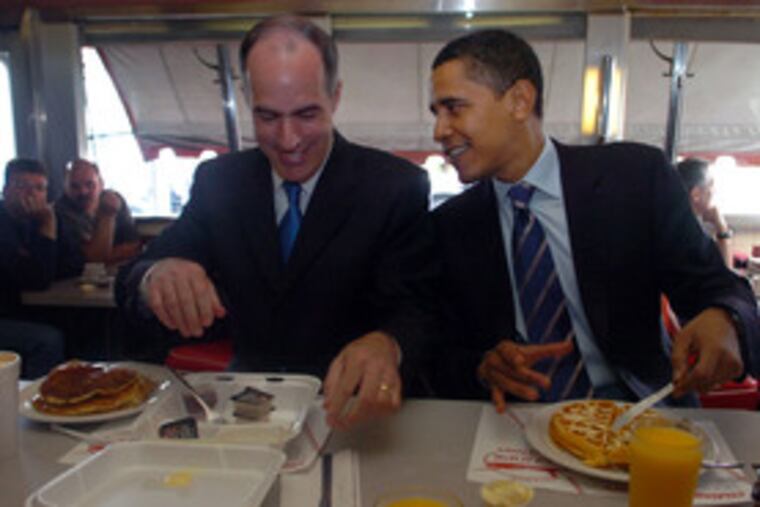'It's going to be close,' Obama says
The prediction came on a Pittsburgh radio station. He said he was not expecting to win.

PITTSBURGH - Whatever electoral fate awaits him in the Pennsylvania primary, Sen. Barack Obama's tone and body language in the campaign's closing hours yesterday seemed to indicate he was reconciled to it.
"I'm not predicting a win," he said in a morning radio interview with KDKA-AM radio in Pittsburgh. "I'm predicting that it's going to be close and that we are going to do a lot better than people expect."
Obama did not speak directly with reporters traveling with him on his chartered plane from Scranton to Philadelphia to Pittsburgh, but his chief strategist, David Axelrod, said from aboard the Boeing 757: "I am not standing here telling you we expect to win. . . . I don't think anybody expects us to win."
Axelrod sought to emphasize how much ground Obama seemed to have gained in six weeks of on-and-off campaigning across the state - and from an expenditure of millions of dollars on campaign ads.
"I'm confident we're going to get our share of votes," he said. ". . . I don't know what that share will be. I'm confident we're better off than we were six weeks ago. . . . When you start 20 points behind, that's a heavy hill to climb."
On his last full day in Pennsylvania, Obama, like Sen. Hillary Rodham Clinton, began in Scranton, where he dropped in at a diner. He also appeared on The Daily Show With Jon Stewart, saying, "We think there's going to be a high turnout."
Obama closed out the final full day of the campaign with one of the biggest indoor rallies he has had anywhere - in the new basketball arena at the University of Pittsburgh. Campus police officially estimated the crowd in the Petersen Events Center at 10,000.
The candidate, with arms crossed, smiled and leaned his head back, scanning the rafters, as he was introduced by an assortment of speakers.
Teresa Heinz Kerry, wife of 2004 Democratic nominee John Kerry, told the crowd, "Just imagine: We have the opportunity to elect the first African American president."
The crowd responded, clapping and chanting, "Yes, we can; yes, we can."
"We don't have to settle for what is. We can imagine what might be," Obama told the throng. "The force that will bring about that better life, that better world . . . comes from the bottom up. It comes from the people, their determination, their hopes. . . . This generation has its own call to action. . . . We are in a defining moment in our history."
Earlier, in midafternoon, he conducted a roundtable talk with about 40 selected people on the lawn of Montgomery County Community College in Blue Bell. Meeting with the group in a circle on park benches, Obama took off his jacket and rolled up his shirtsleeves.
Asked what he would do in his first hundred days as president, he said that the Iraq war would top his priority list.
He said he would call the Joint Chiefs of Staff into a room "and give them a new mission - to set a date for our withdrawal out of Iraq."
His second major move, he said, would be to begin work on a national health-care plan open to all Americans. Next, he said, he would work toward a national energy plan, focusing on infrastructure investment in environmentally friendly "bio fuels."
Last evening, in McKeesport, east of Pittsburgh, Obama paced back and forth with a microphone in the gym of the Greater Allegheny Pennsylvania State University.
Repeating a core theme of his campaign, he said the state and the rest of the nation were ready for change - "not itsy-bitsy change, but real change."
He said of his rival: "Sen. Clinton does not recognize that we need to fundamentally change how Washington works."
At one point, he was asked what he was doing to oppose Internet rumors that he is a Muslim. Obama noted that his patriotism also had been questioned, and he replied:
"It frustrates me when people would even have a question about something like that, because they don't ask the same question of some other candidates. And that concerns me. . . . In terms of my Christian faith, I am a Christian and I have been a Christian."
Through a spokesman, Obama shot back at a new campaign ad by Clinton expanding on her longtime theme that when emergency calls at 3 a.m., Americans want someone with a lot of political experience in the White House.
Nothing in the narration is unusual, at least not in campaign terms, but the video images are striking - scenes of past national disasters, including Pearl Harbor, and a brief shot of a walking Osama bin Laden.
Obama spokesman Bill Burton said it was Clinton, not Obama, who had voted as a senator to authorize the Iraq war. That war, he said, "diverted our military from the terrorists who attacked us, and allowed Osama bin Laden to escape and regenerate his terrorist network."